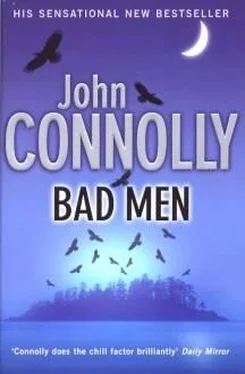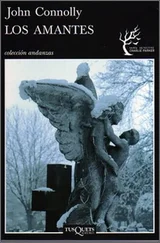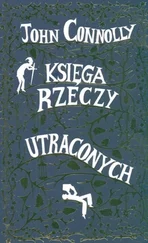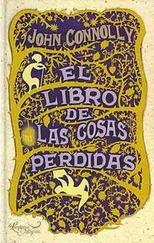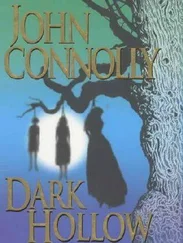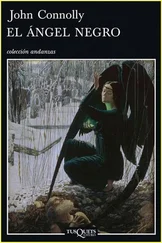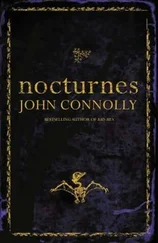The woman with the light was not dead.
The child is not floating in the air.
Sylvie feels something brush against her cheek. It hovers before her eyes and its wings make a dull clicking noise as it strikes the windows and roof of the car. It is a gray moth. There are others nearby. She senses them on her skin and in her hair.
“Honey,” she says, haltingly, her hand striking feebly at the insects. “Get help. Go get your mommy or your daddy. Tell them the lady needs help.” Her eyes flutter closed. Sylvie is fading now. She is dying. She was mistaken. There is no hope.
But the child does not leave. Instead, she leans into the car, forcing her body through the narrow gap between the window and the door, head first, then shoulders. The hissing grows louder. Sylvie feels a coldness at her brow, brushing across her cheeks, coming at last to rest upon her lips. There are more moths now, the sound of them louder and louder in her ears, like a scattering of applause. The child is bringing them. They are somehow a part of her. The coldness against her mouth grows in intensity. Sylvie opens her eyes and the child’s face is near her own, her hand stroking Sylvie’s forehead.
“No-”
And then fingers begin to probe at her lips, pushing against her teeth, and she can feel old skin crumbling like dust against her tongue. Sylvie thinks instinctively of the moths, of how one of the insects might feel in her mouth. The fingers are deep inside her, touching, probing, gripping, trying desperately to get at the warmth of her, the life within. She struggles against them and tries to scream, but the thin hand muffles her voice. The child’s face is close to her own now, but there is still no detail. It is a blur, a painting left out in the rain, the shades running, blending into one another. Only the eyes remain clear, black and hungry, jealous of life.
The hand withdraws, and now the child’s mouth is against her own, forcing it open with her tongue and teeth, and Sylvie tastes earth and dead leaves and dark, filthy water. She tries to push the child away and feels the old bones beneath the cloak of vegetation and rough, rotted clothing.
Now it is as if her last energies are being drawn from her by the phantom child; a dying girl, being preyed upon by a dead girl.
A Gray Girl.
The child is hungry, so very hungry. Sylvie digs her hands into the child’s scalp and her nails rake across her hair and skin. She tries to force her away, but the child is gripping her neck, holding her mouth against her own. She sees other vague shapes crowding behind, their lights gathering, drawn by the intensity of the Gray Girl’s hunger, although they do not share her appetites and are still kept back by their fear of her.
Then, suddenly, the child’s mouth is no longer against hers, and the feel of the bones is gone. The lights are departing, and other lights are replacing them, these harsher than before, shedding true illumination. A man approaches her, and she thinks that she recognizes him from somewhere. He speaks her name:
“Sylvie? Sylvie?”
She hears sirens approaching.
“Stay,” she whispers. She takes hold of his arm and draws him to her.
“Stay,” she repeats. “They’ll come back.”
“Who?” he says.
“The dead ones,” she says. “The little girl.”
She tries to spit the taste of the child from her mouth, and dust and blood dribble onto her chin. She begins to shake, and the man tries to hold her and comfort her, but she will not be comforted.
“They were dead,” she says, “but they had lights. Why do the dead need light?”
And the world turns to darkness, and she is finally given the answer that she seeks.
The waves break on the shores of the island. Most of the houses are dark. No cars move on Island Avenue, the community’s main street. Later, when morning comes, the postmaster, Larry Amerling, will be at his desk, waiting for the mail boat to bring the first delivery of the day. Sam Tucker will open the Casco Bay Market and lay out the day’s baking of doughnuts and croissants and pastries. He will fill the coffee urns and greet by name those who drop in to fill up their travel cups before they take the ferry into Portland. Later, Nancy and Linda Tooker will open up the Dutch Diner for its traditional seven hours of business-seven until two, seven days a week-and those who can afford a more leisurely approach to life will wander down for breakfast and a little gossip, eating scrambled eggs and bacon as they look out of the windows and onto the little landing where Archie Thorson’s ferry arrives and departs with reasonable regularity and slightly less reasonable punctuality. As midday comes, Jeb Burris will transfer his attentions from the Black Duck Motel to the Rudder Bar, although in winter neither business places great demands upon his time. Thursday to Saturday, Good Eats, the island’s sole restaurant, opens for dinner, and Dale Zimmer, the chef and owner, will be down at the landing negotiating prices for lobster and fish. Trucks will leave Jaffe Construction, the island’s biggest employer (with a total of twenty employees), to deal with Covey Jaffe’s current slate of jobs, ranging from house construction to boat repair, Covey being a man who prides himself on the flexibility of his workforce. This being early January, school is still out, so Dutch Island Elementary remains closed, and the older kids will not be taking up space on the ferry to the mainland schools. Instead, some of them will be thinking up new ways to make mischief, new places in which to smoke pot and screw, preferably far from the eyes of their parents or the police. Most will not yet know of the deaths of Wayne Cady and Sylvie Lauter, and when they learn of the accident the next morning, and its impact sinks in, there may be fears of reprisals from the adult community in the form of parental constraints and increased police vigilance. But in the first moments there will be only shock and tears; boys will remember how they lusted after Sylvie Lauter, and girls will recall with something like affection Wayne Cady’s adolescent fumblings. Bottles will be raised in secret, and young men and women will make their pilgrimages to the Cady and Lauter houses, standing in embarrassed silence as their elders hug one another in open grief.
But for now, the only light that burns on Island Avenue, with the exception of the island’s twelve (count ’em) street lamps, can be found in the Dutch Island Municipal Building, home to the fire department, the library, and the police department. A man sits slumped in a chair in the small office that constitutes the home of Dutch Island’s police force. His name is Sherman Lockwood, and he is one of the policemen from Portland on permanent roster for island duty. He still has Sylvie Lauter’s blood on his hands and his uniform, and glass from the shattered windshield of the car is caught in the treads of his boots. A cup of coffee lies cold before him. He wants to cry, but he will hold it inside until he returns to the mainland, where he will awaken his still-sleeping wife by pressing his face to her skin and holding her tightly as the sobs shudder through him. He has a daughter Sylvie Lauter’s age, and his greatest nightmare is that someday he may be forced to look upon her as he looked upon Sylvie this night, the promise that her life held now given the lie by her death. He holds out his hand, and the light from the desk lamp shows up the blood still caught beneath his nails and in the wrinkles of his knuckles. He could go back to the bathroom and try to remove the last traces of her, but the porcelain sink is speckled with red and he thinks that if he looks upon those marks, he will lose control of himself. And so Sherman balls his hands into fists, eases them into the pockets of his jacket, and tries to stop his body from trembling.
Читать дальше
